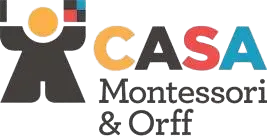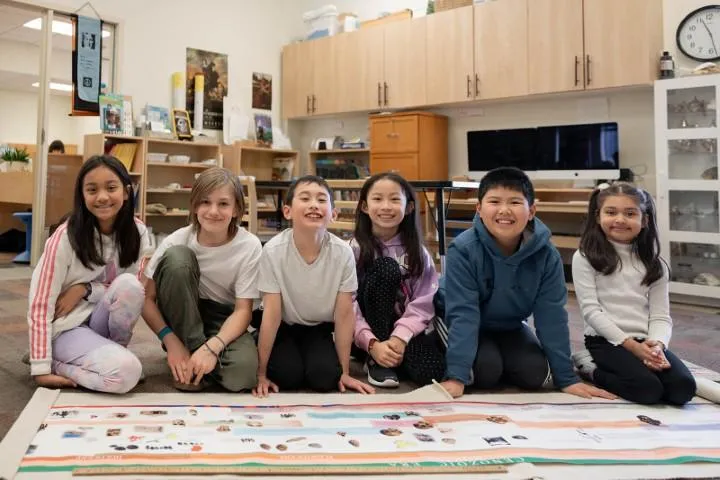What Makes Our Elementary Program Unique?
1. Advanced Montessori Curriculum
Our curriculum focuses on fostering deeper understanding and application of academic concepts through:
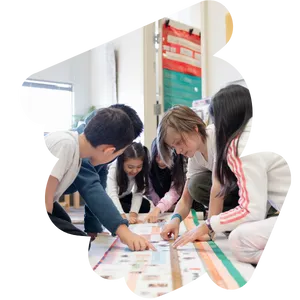
Language Arts
• Reading – Early exercises are used to practice reading and recognizing parts of speech such as nouns, verbs, and adjectives. Interpretive reading for comprehension at ever-increasing levels of difficulty. Children will use library and reference books for both research and pleasure. Novel Study is a monthly focus, and the Junior Great books are used to develop critical thinking.
• Handwriting – Many exercises are used to develop and prepare the hand to write cursively through beautiful Montessori presentations.
• Composition – Once handwriting is accomplished, children start to develop their composition skills by understanding sentence structure, paragraph structure, etc. Research skills and preparation of reports gradually become a major part of the educational program. Students will compose short stories, poems, plays, reports and news articles. The development of essay writing begins in Lower Elementary, where students are encouraged to write paragraphs that are descriptive and gradually build the paragraphs into an essay.
• Grammar - a whole grammar learning scheme is presented with the use of Montessori materials called Grammar boxes. In Grades 4-6 ( Upper elementary) this study is taken further increasing students writing skills, sentence structure and comprehension.
• Spelling – Students use the movable alphabet to sound out and spell words as they learn to read.
• Word Study -The study of compound words, singular/plural, masculine/feminine, prefixes, suffixes, synonyms, antonyms homonyms, contractions, idioms, similes, and metaphors. Increasing comprehension, spelling and writing skills.
Mathematics
Study of the four basic operations with the use of the golden beads: addition, multiplication, subtraction and division continues. Children then begin the “passage of abstraction” by solving problems with paper and pencil. Children will work with fractions, decimals and geometry. They study money units, history, equivalent sums and foreign currencies as part of social studies. They also study the history of mathematics, its application in science, graph reading and preparation and statistical analysis. Students learn the nomenclature, characteristics, measurement and drawing of geometric shapes and concepts such as point angle and surface solid, etc.
Geography
Physical, cultural and economic geography is studied. Through the use of puzzle maps, children will study land and water formations, longitude and latitude, coordinate positions on the globe, the earth’s poles, the history and use of the compass, topographic maps, and much more. At the primary level, we have concentrated on studying continents. At the elementary level, our cultural studies are more specific, and countries are studied in many ways: geography, climate, fauna, flora, major rivers and lakes, cities, mountains, people, food, religion, etc. Children also study the natural resources of the earth in terms of production, imports, exports and interdependence. The presentation of the Great Stories helps children understand the universe.
Music
They will continue with the Orff music program and will also have access to music materials within their classroom. This will include further studies of classical music, rhythm, voice, dance, movement, Orff instruments (including playing the recorder) and composing music.
Art
Art is integrated into the whole curriculum. Art is used to expand lessons in science, geography, history, language arts and math. Formal art instruction is also given in the classroom through a variety of techniques and media. Artists and schools of art are also explored.
History
Each year children will continue to study and analyze the needs, culture, technology and social history of various periods in history. Development of transportation, architecture, great inventions and great leaders will also be studied.
Science
Children continue to focus on botany and zoology as they have already been doing in the primary classrooms through the identification, labelling and naming of various plants and animals. The children do a very specific study of the animal kingdom, including mankind. Students are also introduced to Chemistry and Physics through the study of the Elements and through various experiments.
Languages
French is introduced to the children. The emphasis is on children gaining a love for the language, building a vocabulary and basic grammar skills. The classroom has materials that children will be able to work with once they have mastered their reading skills.
Computers
Computers are available in the classroom. The primary purpose of the computers will be for research and writing purposes. Children will also learn skills in keyboarding, word processing, graphing, spreadsheets and photography.
2. The Great Stories
Montessori’s Great Stories ignite imagination and curiosity with narratives that include:
The origins of the universe.
The development of life on Earth.
The history of human innovation, how language and math developed over time. These stories connect subjects and inspire students to ask big questions about their world.
3. Individually Chosen Research
Elementary students take ownership of their learning through passion-driven research:
Research Projects: Students delve into topics they love, creating detailed reports and presentations.
Collaboration: Group projects foster teamwork, leadership, and public speaking skills.
Cosmic Project: Lower elementary students work on a cosmic project: using a specific subject and learning about it in a cross-curricular way.
Great Project: Upper elementary students work on a Great Project each year choosing a specific subject and studying the specific subject in each area of the classroom. This is then presented.
4. Montessori Model United Nations (MMUN) Conference for the Upper El 3rd Years
Upper Elementary students (Grades 4–6) participate in the Montessori Model UN, representing countries and debating global issues. This program:
Builds public speaking and negotiation skills.
Encourages empathy and global citizenship.
Provides a transformative experience that sparks deeper engagement with world affairs.
Montessori Model United Nations (MMUN) – The Montessori Model UN Conference is a simulation of United Nations Committees that discuss real issues and convene to debate and vote on resolutions proposed by students who act as Delegates in different committees such as UNICEF, Human Rights Council, and UNEP.
The 3rd year Upper El (Grade 6) students begin a course of study, attending an MMUN Club which culminates in their participation at the MMUN Conference held in New York City. At this Conference, around 2000 Montessori students from around the world gather to debate issues of global importance. Participants call the Montessori Model United Nations Conference a “life-changing experience”.
5. Social Skills, Character, Ethics, Peace Studies and Community Service
The Elementary classroom operates as a small social community in which children learn to work together, resolve conflicts peacefully, encourage and acknowledge each other, and work as committees to complete tasks. Dr. Montessori also noted that the Elementary years are a time when children are developing their sense of justice and moral reasoning. Montessori children question and learn about aiding people in need from the elderly to the poor. They become involved with charities, community service projects, recycling, composting, international issues wildlife preservation, etc.
Students actively contribute to their communities through service projects:
Organizing charity drives and environmental initiatives.
Supporting local, national and global organizations through meaningful outreach.
6. Health, Wellness and Physical Education
Children develop a personal program of lifelong exercise, recreation and health management. The Montessori approach to health and fitness helps children to understand how their bodies function through the study of diet, nutrition, first aid, stress management and peacefulness.
The outdoors is used extensively for daily activities. Movement activities will be included in the music program. Yoga is also part of the curriculum. Children attend 3 different physical activities over the course of the year. Traditionally, these are: Tennis, Ice Skating and Volleyball.
7. Field Trips
“Going out” is a large part of the curriculum, and it includes the Planetarium, the Museum, the Art Gallery, and many other destinations. They will also visit local government centers, libraries, laboratories, and businesses.
A Typical Day in the Elementary Classroom
Morning Work Cycle:
Students independently select materials aligned with their interests, while guides provide small-group lessons in math, language arts, geometry, and the sciences. Hands-on research and creative projects encourage curiosity and skill development. Students often present their findings to peers, building confidence and communication skills.
Midday Sharing Time:
This meeting time is led by students. A specific agenda is followed where students share appreciation, discuss and solve issues and share new business. This Collaborative group time fosters teamwork, respect and critical thinking.
Outdoor Play and Exploration:
Students refresh their minds and bodies with outdoor activities like physical education, nature studies, and free play.
Afternoon Time:
Students continue their work cycle and attend specialties such as Art, French, sporting activities, music classes and Orff groups.
ORFF Music Integration:
Weekly Orff music sessions, recorder lessons, and age-based music lessons inspire creativity and allow students to express themselves in meaningful ways.
Students continue with the Orff music program and also have access to music materials within their music classroom. This includes further studies of classical music, rhythm, voice, dance, movement, Orff instruments (including playing the recorder) and composing music.
Montessori Curriculum Highlights
Language Arts
Advanced comprehension, research writing, and creative expression.
Grammar and sentence structure are explored through storytelling and journaling.
Mathematics
Complex concepts like algebra, geometry, and fractions are made tangible through Montessori materials.
Real-world problem-solving that connects math to daily life.
Science
Hands-on experiments and outdoor studies.
Exploration of topics like astronomy, botany, and environmental conservation.
Cultural Studies
This is enhanced through the Great Stories and the impressionist Stories in botany and geography.
Global geography and historical timelines foster a deeper understanding of the world.
Cultural awareness through art, food, and traditions from around the globe.
Orff Music
This is available throughout most of the day and children are encouraged to create, compose and enjoy music resulting in three performances yearly!
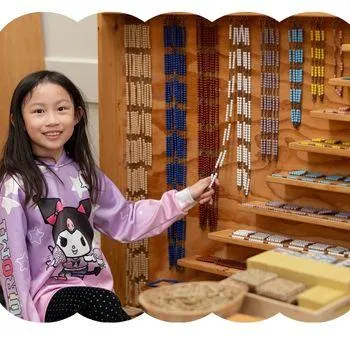
Why Parents Choose Us
1. Personalized Learning
Guides tailor lessons to individual strengths, ensuring every child reaches their full potential.
2. Critical Thinking and Collaboration
Students develop problem-solving skills and teamwork, preparing them for real-world challenges.
3. Global Engagement
Through programs like the Montessori Model UN and cultural studies, children learn empathy, leadership, and a global perspective.
4. Creativity and Expression
Art, music, and storytelling are integrated into every aspect of the curriculum, helping children discover their passions and talents.
5. Focused on the developmental stages ( Sensitive Periods) of the elementary aged child
Socialization; truth and justice; fairness; economics including money; and machines are all tapped into in the classroom which encourages further learning.
STILL NOT SURE?
Frequently Asked Questions
What is the Montessori Model UN?
The Montessori Model UN is a global program where students debate real-world issues in a simulated United Nations setting, developing public speaking and leadership skills.
How do group projects benefit my child?
Group projects foster teamwork, communication, and confidence. They encourage students to take initiative and collaborate effectively with peers.
How does this program prepare my child for middle school?
The Montessori Elementary Program builds a strong academic foundation while nurturing independence, critical thinking, and self-discipline—qualities that prepare students for a seamless transition to middle school.
What opportunities are there for parents to get involved?
Parents are welcome to participate in special projects, volunteer for events, and collaborate on service initiatives, fostering a strong sense of community.
Does the school offer day care for my Elementary Child?
Yes care is offered for no charge between 8.00 am and 5.00 pm. Licensed Care for Inservice days and Spring Break is offered and incorporated into the Early Childhood Classroom for a minimal cost. Care is also offered from 7.30 -8.00 and 5.00-5.30pm for an additional cost and incorporated into the Early Childhood Classrooms.
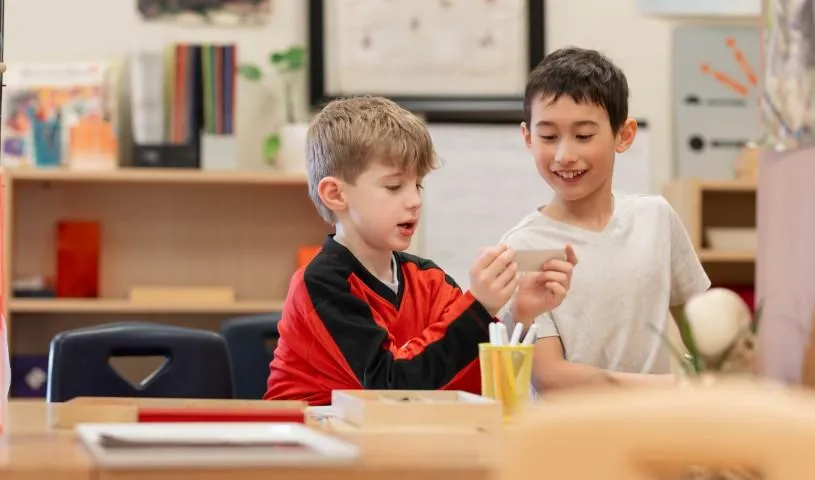
Schedule & Fees
The Elementary Program runs from September to June, following a traditional school-year calendar.
5 Full Days (8:30 AM–4:00 PM): $1,260/month
Care between 8.00 and 5.00 is offered at no additional cost
Lunch is also incorporated
Extended care options are available:
Early Drop-Off (7:30–8:00 AM): Additional $640/year
Late Pick-Up (5:00–5:30 PM): Additional $640/year
TESTIMONIALS
What parents are saying
he Montessori approach has transformed my daughter’s learning experience. She’s confident, curious, and engaged in ways I never imagined.
– Parent of a Grade 3 student
The Montessori Model UN was life-changing. My son came back inspired, and it’s sparked conversations about global issues at home
– Parent of a Grade 6 student
Book a Virtual Info Session
Discover how Casa Montessori’s Elementary Program inspires confidence, creativity, and critical thinking.
Once you have attended an Info session, filled out an Application form and paid the application fee you will be asked to submit a report card for your child.
Your child will be invited for a one hour visit in the morning.
After meeting with the Director/principle you will receive confirmation.





Our top rated skills you can learn
Discover Our Top-Rated Skills Elevate Your Expertise with the Best Courses for Learning and Mastering Essential Abilities.
23,000+ more skillful courses you can explore
Your Path to Passive Income
They will teach you the best strategies, tools, and tips to find profitable niches, create engaging content, generate traffic, and convert visitors into buyers.
Upcoming Events
Our affiliate courses are designed by experts who have years of experience and proven results in the affiliate marketing industry.
No blogs found
Join Our Community
Discover how Casa Montessori & Orff School can nurture your child’s unique potential. We invite you to visit our school, meet our educators, and experience the Montessori difference first-hand.
Our Latest Articles
No blogs found
Locations
1055 Wilkes Avenue, Winnipeg
80 Fennell Street, Winnipeg
Explore Site
Programs
Useful Links
Keep In Touch
Get updates on openings and other news
